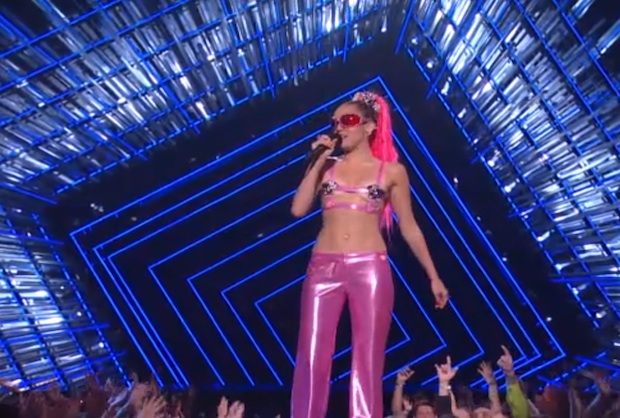MTV’s 2015 Video Music Awards was the most tweeted (non-Super Bowl) event since…wait for it…tracking ever began! Really? Even if it were only the most tweeted event since this year’s Super Bowl, I would say we have a problem. I mean, I rarely write from a negative place, and genuinely hate sounding as curmudgeonly as this. But, you know, a lot of things have happened this year – good and bad – which would have, I hope, generated more tweets than the VMA’s!
When the?“most tweeted” status is earned by a show that seems mostly about how many body parts one can get away with exposing, and the total sexualization of virtually every moment of the event, it just feels like somewhere we’ve crossed some important lines: the difference between comfort with the human body and objectification of that body, between art which can (and often should) provoke and provocation for its own sake, between culture which generates celebrity and celebrity which drives the culture, just to name a few.
It was like a celebration of a really unhealthy race to the bottom.
Believe me when I write about lines being crossed, I write as one as deeply committed to the permeability of lines as I am to the presence of the lines themselves. In fact, this seems to be a theme for me this week, having written about the debate over walls on our national borders. But I also write as a father of three daughters – 14, 19 and 21 years old – all of whom are coming of age in a culture whose demands on them as young women aren’t healthy, to say the least.
Now I get it, the VMA’s are not educational programming and their job is to entertain, not model optimal behavior for an audience of “normal” viewers. That even helps explain why the broadcast, versus more important events in the world, lit up the Twitterverse as it did. But still, when young women in my office come in the day following the VMA’s commenting on how out of control it all felt (as one of them described it to me: it was like a celebration of a really unhealthy race to the bottom which they feel defines their world, even though they wish it didn’t), we do have a problem.
But I also believe that the best response to a moment of darkness (too harsh a word, but it works for the metaphor) is to light a candle, not curse the darkness. I think the best move here is to imagine what things we all could tweet this week that celebrate more positive values and a healthier culture – one which celebrates freedom of expression, appreciates entertainment and celebrity, and feels less like an invitation for young women – or anyone else, for that matter – to run any kind of race other than their own.
Image credit: MTV.com

Listed for many years in Newsweek as one of America’s “50 Most Influential Rabbis” and recognized as one of our nation’s leading “Preachers and Teachers,” by Beliefnet.com, Rabbi Brad Hirschfield serves as the President of Clal–The National Jewish Center for Learning and Leadership, a training institute, think tank, and resource center nurturing religious and intellectual pluralism within the Jewish community, and the wider world, preparing people to meet the biggest challenges we face in our increasingly polarized world.
An ordained Orthodox rabbi who studied for his PhD and taught at The Jewish Theological Seminary, he has also taught the University of Pennsylvania, where he directs an ongoing seminar, and American Jewish University. Rabbi Brad regularly teaches and consults for the US Army and United States Department of Defense, religious organizations — Jewish and Christian — including United Seminary (Methodist), Yeshivat Chovevei Torah (Modern Orthodox) Luther Seminary (Lutheran), and The Jewish Theological Seminary (Conservative) — civic organizations including No Labels, Odyssey Impact, and The Aspen Institute, numerous Jewish Federations, and a variety of communal and family foundations.
Hirschfield is the author and editor of numerous books, including You Don’t Have To Be Wrong For Me To Be Right: Finding Faith Without Fanaticism, writes a column for Religion News Service, and appears regularly on TV and radio in outlets ranging from The Washington Post to Fox News Channel. He is also the founder of the Stand and See Fellowship, which brings hundreds of Christian religious leaders to Israel, preparing them to address the increasing polarization around Middle East issues — and really all currently polarizing issues at home and abroad — with six words, “It’s more complicated than we know.”

